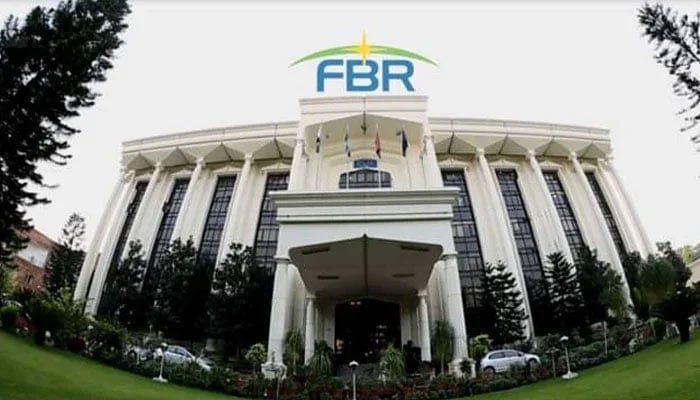IMF wonders how Rs200bn fiscal gap to be filled without agreed upon tax measures
IMF raised objections over gap of Rs150-200bn in fiscal framework of FBR and inquired how it is going to be filled for the upcoming fiscal year 2024-25.
ISLAMABAD: The International Monetary Fund (IMF) has raised objections over the gap of Rs150-200 billion in the fiscal framework of FBR and inquired how it is going to be filled for the upcoming fiscal year 2024-25.
The IMF showed serious concerns over the FBR’s move to grant tax exemptions for another fiscal year for Fata/Pata areas and asked how the gap of Rs80 to Rs100 billion will be recovered from other revenue-generating areas.
Top official sources also confirmed that the government had raised taxation on real estate by raising tax rates in the shape of advance tax for sellers and purchasers, jacking up gains tax and imposing 5 percent FED on commercial plots.
It has also been decided to revise upward valuation rates for properties notified by the FBR from July 2024 for all major cities.
However, chances have now surfaced that the Finance Bill 2024-25, which is already tabled before parliament, might witness some revision if Pakistani authorities are unable to convince the IMF on how they will materialize the highly ambitious tax collection target of Rs12,970 billion.
The FBR’s annual tax collection has been put at Rs12,970 billion for the next fiscal against a revised target of Rs9,252 billion for the outgoing fiscal year, projecting a surge in revenues by 40 percent.
In its first reaction shared by the IMF with Pakistani authorities after the announcement of the budget for 2024-25 the Fund asked questions over the hole of Rs200 billion for achieving the envisaged annual tax collection target of Rs12,970 billion for the next fiscal year.
For instance, the government agreed with the IMF to abolish tax exemption for Fata and Pata for the next fiscal year. The FBR proposed to the federal cabinet to remove the tax exemptions but the federal cabinet preferred to keep the exemption for another fiscal year till the end of June 2025. According to the FBR estimates, this exemption alone is going to cause a heavy cost of Rs80 to Rs100 billion for the next budget.
“There are some other tax incentives for which different sectors are lobbying for convincing the government,” said the official sources. The IMF has pointed out that there was a possibility of the hole of Rs200 billion in target, so the government will have to come up with additional measures for incorporating it as part of the revised Finance Bill for 2024-25 before getting approval from parliament.
The sources said the IMF did not accept administrative or enforcement measures in calculating the FBR’s ability to generate the desired revenues. The FBR requires increased tax collection of Rs3.718 trillion. With a nominal growth rate of 15.6 percent, the FBR could fetch Rs1.5 trillion so the remaining Rs2.2 trillion will be collected through taxation and enforcement measures. The FBR claimed that it had taken taxation measures of Rs1.7 trillion through additional measures and enforcement steps. However, the question arises how the FBR is going to meet a gap of Rs0.5 trillion in the next fiscal year.
The IMF has so far raised questions over those steps which were agreed with the Fund for removing tax exemptions but in the budget announcement such agreed measures were dropped. Now the IMF wants to know how the fiscal gap in the range of Rs150-200 billion will be bridged in the next fiscal year.
-
 Heavy Snowfall Disrupts Operations At Germany's Largest Airport
Heavy Snowfall Disrupts Operations At Germany's Largest Airport -
 Andrew Mountbatten Windsor Released Hours After Police Arrest
Andrew Mountbatten Windsor Released Hours After Police Arrest -
 Heidi Klum Eyes Spooky Season Anthem With Diplo After Being Dubbed 'Queen Of Halloween'
Heidi Klum Eyes Spooky Season Anthem With Diplo After Being Dubbed 'Queen Of Halloween' -
 King Charles Is In ‘unchartered Waters’ As Andrew Takes Family Down
King Charles Is In ‘unchartered Waters’ As Andrew Takes Family Down -
 Why Prince Harry, Meghan 'immensely' Feel 'relieved' Amid Andrew's Arrest?
Why Prince Harry, Meghan 'immensely' Feel 'relieved' Amid Andrew's Arrest? -
 Jennifer Aniston’s Boyfriend Jim Curtis Hints At Tensions At Home, Reveals Rules To Survive Fights
Jennifer Aniston’s Boyfriend Jim Curtis Hints At Tensions At Home, Reveals Rules To Survive Fights -
 Shamed Andrew ‘dismissive’ Act Towards Royal Butler Exposed
Shamed Andrew ‘dismissive’ Act Towards Royal Butler Exposed -
 Hailey Bieber Shares How She Protects Her Mental Health While Facing Endless Criticism
Hailey Bieber Shares How She Protects Her Mental Health While Facing Endless Criticism -
 Queen Elizabeth II Saw ‘qualities Of Future Queen’ In Kate Middleton
Queen Elizabeth II Saw ‘qualities Of Future Queen’ In Kate Middleton -
 Amanda Seyfried Shares Hilarious Reaction To Discovering Second Job On 'Housemaid': 'Didn’t Sign Up For That'
Amanda Seyfried Shares Hilarious Reaction To Discovering Second Job On 'Housemaid': 'Didn’t Sign Up For That' -
 Hilary Duff Reveals Deep Fear About Matthew Koma Marriage
Hilary Duff Reveals Deep Fear About Matthew Koma Marriage -
 Will Sarah Ferguson End Up In Police Questioning After Andrew’s Arrest? Barrister Answers
Will Sarah Ferguson End Up In Police Questioning After Andrew’s Arrest? Barrister Answers -
 Matthew McConaughey Gets Candid About AI Threat To Actors: 'Be Prepared'
Matthew McConaughey Gets Candid About AI Threat To Actors: 'Be Prepared' -
 Hailey Bieber Shares How 16-month-old Son Jack Blues Is Already Following In Justin Bieber's Footsteps
Hailey Bieber Shares How 16-month-old Son Jack Blues Is Already Following In Justin Bieber's Footsteps -
 Zuckerberg Denies At LA Trial That 'Instagram Targets Kids' Amid Addiction Claims
Zuckerberg Denies At LA Trial That 'Instagram Targets Kids' Amid Addiction Claims -
 France Sees Record 102mn International Tourists In 2025
France Sees Record 102mn International Tourists In 2025




